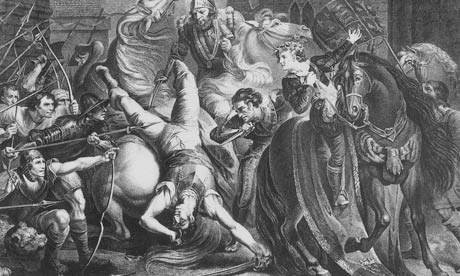
A Danish colleague asks me why, given the evident inequalities in Britain, has there never been a revolution? Mention of the civil war was clearly unsatisfactory.
There have been lots of revolutions in Britain (the peasants' revolt, the glorious revolution, the Jacobite rebellion …). The reason why your colleague has never heard of them is that they all failed. In the one case where the rebels won – the civil war – we tried it out for a generation, decided it had been a bad idea and reinstalled the status quo, with minor amendments; which is probably why your colleague won't accept it as a proper revolution.
The longer answer may be based on the fact that, regardless of how it looks, England (and later the UK) has been a relatively democratic place compared to many of its neighbours, where people have always had some kind of rights.
You can see this in the chapters of the Domesday Book that list the landholdings subject to dispute at the time of the survey, when the rights established in the Saxon kingdoms and the Danelaw were holding up against the Normans. It didn't matter if you were the king's brother-in-law and the biggest landowner in the kingdom: if the men of the wapentake moot hadn't witnessed your being seised of the bit of ploughland occupied by Egbert the peasant farmer, then, my lord, that land was not yours, and he had every right to take you to court about it. Then, just as the Norman kings had finally ground down the lower orders, there was Magna Carta.
There was always just enough equity around to make most people feel it was worth sticking with the status quo, because revolting might actually make the situation worse. so the rebels could never get enough people on their side to overcome the establishment.
Rachelthedigger
As an Australian living in London, I've often wondered about this myself. Britain was indeed close to revolution a number of times, but it was headed off in part by the transportation of key political dissidents to the Australian colonies, and in part by political repression, particularly by the likes of prime minister Lord Wellington. These dissidents included the Tolpuddle martyrs, the Young Irishmen, the Scottish martyrs, the swing rioters, the Nore and Spithead naval mutineers, and others.
Many desperate working-class Britons were sent to the colonies for theft (the cliched loaf of bread), so the general population was kept in check by fear of a lifetime's exile and a loss of their potential political leaders.
Lisa Jenkins, London TW1.
The weather. One day freezing, the next sweltering – rain, snow, sunshine – anything can happen. There's nothing we can do about it except grin and bear it, which is the national philosophy, also applied to politics.
Michael Short, St Leonards-on-Sea, E Sussex
Who is the greatest fictional detective? Holmes? Marlowe? Marple?
Surely MP Shiel's Prince Zaleski (1895). He never left his room – just sat there surrounded by priceless oriental antiques, smoking hashish ("the bhang of the Mohammedans") and free-associating through his stores of esoteric knowledge until the solution popped into his head.
Mike Jay, London
It's got to be Inspector Clouseau.
David Prothero, Harpenden, Herts
The earliest fictional detective must be Daniel in the Apocrypha, solver of the classic locked room mystery in Bel and the Dragon, and the contradictory statements in Susanna and the Elders.
Gavin Ross, Harpenden, Herts
Why is it that though French markets groan with fantastic vegetables they rarely appear on restaurant plates?
I ran a restaurant in France for 15 years and had a hard time getting my customers to eat anything other than chips, which are rarely cooked at home because it's too much fuss, and green beans, of which they would eat a spoonful. I used to have to practically force-feed them with stuff like beetroot, lentils, celeriac, etc. I'd send out little bowls as a taster before the meal, and that way the more adventurous would try some. It probably has something to do with school meals, which, as in England when I was at school, were all about badly cooked cabbage and stuff you had to eat up.
Another reason is that in a classic French service the meat and the vegetables were served as two separate courses, and when menus were simplified, mainly postwar, there was a tendency to skip the vegetable course.
lafranglaise
Any answers?
The Avengers Assemble film is coming soon. But could the Marvel comics team beat DC's Justice League of America?
James Green, Leeds
I want to read a philosopher to help steer me through these dark days of austerity. Who should it be?
Janet Thomson, Exeter
Why do trees beside roads grow/lean inwards to make a tunnel?
A Kirby, Banstead, Surrey
• Post your questions and answers below or email nq@theguardian.com (please include name, address and phone number).

